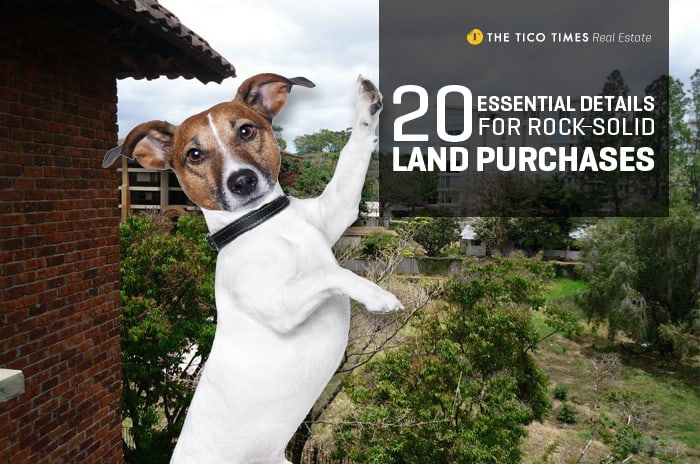Is buying land in Costa Rica really a rock-solid investment, as some real estate agents will tell you? Is it smart to put your hard-earned money into buying land in Costa Rica?
Yes, it is, if you know what you’re doing, play by the rules, use common sense and follow the advice on how to buy land in Costa Rica in this article. I’ve gotten emails from the heirs of land investors saying, “My dad owns land in Costa Rica but we can’t find the paperwork on it and we don’t know where it is. Can you help?”
Maybe Dad did make the best investment of his life and 40 years later the land is worth a fortune. Or maybe there are now squatters on it. Maybe the city foreclosed on it years ago because the property taxes were not paid. Or maybe Dad never paid the corporation taxes?
Buying land in Costa Rica as an investment can only be a smart decision if you keep track of your investment. I like to compare it to buying a new Mercedes-Benz SL600 and leaving it on a midtown Manhattan street with the keys in it, then being surprised when you come back after 60 days and it’s gone.
To make sure you know how to by land in Costa Rica know its a rock-solid investment, here are 20 essential tips that you should pay attention to.
-
Hire the right real estate agent
I know some of my readers do not like the idea of having to work with real estate agents in Costa Rica, and some probably have good reasons. Unless you know the area where you’d like to start buying land in Costa Rica very well, and you know how to take the usual hurdles of buying land for sale by owner, I recommend you get professional help.
If you hire an agent who concentrates on a certain area, has done so for many years, is fully bilingual and knows the lay of the land, you start off on the right foot.
-
Growth path
Find out where the growth path of the real estate development in a community goes — in other words, where new construction will be happening next, given the lay of the land. By just looking at a map, you can find out a lot of information. In Costa Rica, we have lots of mountains, rivers, and canyons that stand in the way of real estate development and that tend to oblige the growth path to go a certain way. Ask for help from local experts.
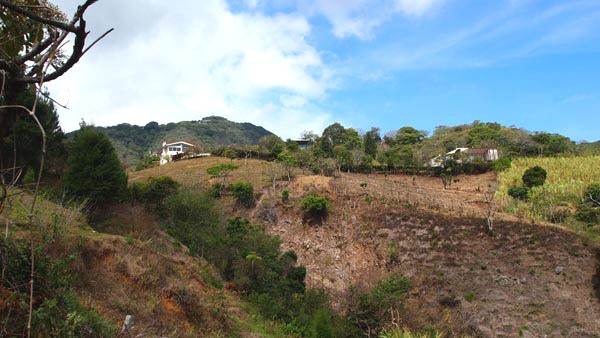
-
Location, location, location
You’ve all heard this one before, but first, you need to know if you’re looking for commercial land or residential land to invest in, and where. Real estate agents usually know the zoning in their areas well and have a zoning map on their computer. A zoning plan, if there is one, will limit certain construction, regulate density and determine commercial, industrial or residential use for anyone buying land in Costa Rica.
Look around the area before you start buying land in Costa Rica, see what’s going on with the real estate development in the area; find out where the hospital, schools, churches and shopping areas are.
-
Old and neglected areas
In every city in the world, old and neglected areas tend to be redeveloped eventually. Developing land at higher densities and a more efficient use of the land to generate more revenue per acre is easier to manage in the old and neglected areas of the city. Find out if the city has any plans for renovating those areas.
-
Topography
In Costa Rica, we have a lot of rain, so you would always want to be at the top of a hill and not at the bottom so you won’t have any drainage problems. Look hard for erosion on the property. If you plan to do any land development in the future and plan to alter the topography of the property, hire a topographer and if necessary a geologist before buying land in Costa Rica, and save yourself a lot of headaches.
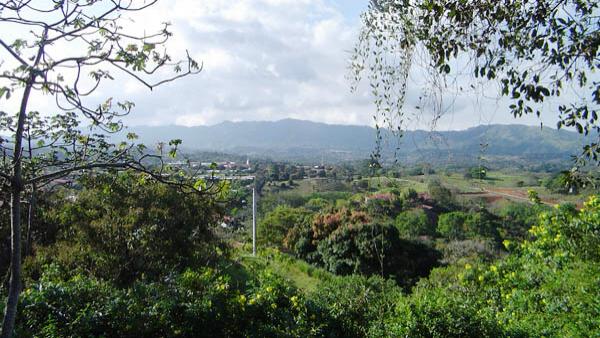
-
Soil studies
Many areas of Costa Rica have bad topsoil, and you will need to replace this bad soil before you build. Or maybe the actual owner used the lot to dump soil from somewhere else to make it a nice and flat-looking lot? Some even use garbage or construction waste materials and then fill, on which you cannot build. Is the lot cut from the mountain or is it all landfill? Is the soil used for the fill of good quality and is it compacted?
First look at the lay of the land. For an expert eye, it’s pretty easy to see if there is landfill or not. Then find out which part of the property you, or a future buyer, would want to build on and ask the owner for permission to put markers on it and have a soil study done. There are several good companies who can do a good soil study, who you can find on Google by searching for “estudio de suelos Costa Rica.”
-
Utilities
Are power and water available at the front of the property so you can just apply for a water and power meter with the utility company and get connected within a week? If your land purchase is a short-term investment, you’d also want to check with the Internet and cable TV providers in the area.
Some areas in Costa Rica have water problems and to be able to get a building permit from the municipality, you need a statement from the water company (or water co-op) that water is available for that particular property. That might not cover the issue forever, and is probably the most insecure part of buying land in Costa Rica, but it’s the best you can do.
As for the sewer, very few areas in Costa Rica have city sewer and most of the country is on septic tanks. If you purchase land in a condominium, find out if there is a sewage plant installed.
-
Zoning
Find out if there is a zoning plan in the city where you want to make your land purchase and check what zoning would apply to this particular property. With a very irregular topography of the land, usually, the density is very low. A high-density property has a much higher chance of rising in value in the future than low-density property.
Request a certification of zoning or “uso de suelo” from the municipality’s engineering department that will tell you all about the restrictions, density, potential and options for subdividing the property.
-
Views
If you are thinking of buying land in Costa Rica for the views, make sure the view cannot be taken away by new construction or neighbors who let trees grow too high. If possible, have your attorney constitute a view easement on the neighboring properties to avoid having your view blocked.
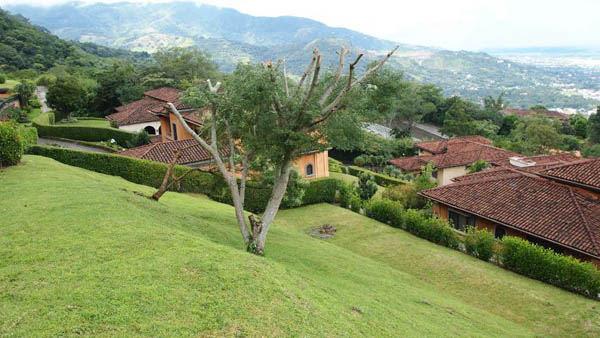
-
Clear title
Hire an attorney who specializes in real estate and have him/her run a complete title check before buying land in Costa Rica. Is the property fully titled or is it a concession in the maritime zone? Have the attorney also check for any liens and annotations. If it makes you feel comfortable, get title insurance.
Request your attorney to go see the property with you with the survey map in hand before signing the option to purchase or sale agreement. Your attorney might charge you extra for this diligence, but it’s a great investment.
-
Easements
Ask your attorney to check if the title includes any easements, which give other people certain rights regarding the property, and have him/her explain them to you. These can include water easements, power easements and right of way easements. Make sure you are not buying a property that is giving an easement to someone else that might not allow your land to be developed as you would want to.
-
Survey
Make your purchase subject to a property survey showing the correct size of the property and its boundaries. Ask your real estate agent to recommend a surveyor who knows the area well but does not use the same surveyor as the seller has used.
Especially those properties that are extremely large and have a highly irregular topography might have differences in size or wrong boundaries. It is possible that the property has not been measured for many years and that neighbors have moved their fences.
Legally, the size is shown in the National Registry and the size on the registered survey map have to be the same. Make sure the survey map is duly stamped by the Cadastre (National Registry).
-
Setbacks on the property
If there is a river or a creek on the property, or on the boundaries, there are probably setbacks, meaning areas where you cannot build within a certain distance of the water. You can have the setbacks checked and certified at the National Institute of Housing and Urban Development (INVU), requesting an “Alineamiento fluvial de ríos y quebradas.”
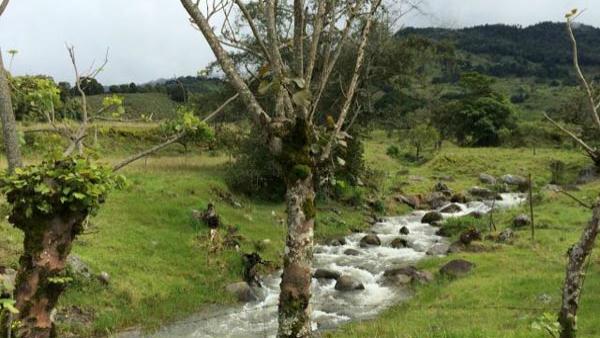
-
Community or condo fees
If you purchase land in a community or in a condominium, read the bylaws and make sure they are legally registered in the National Registry before you sign a promise to purchase. Understand your rights and obligations. Introduce yourself to the condo administration and ask if there are any homeowner association fees, condo fees for raw land, water fees, maintenance fees or other duties, legal or not.
-
Taxes
The municipality where the land is located will charge the owner once a year (payable quarterly) 0.25% of the registered value but will not notify you about it. If you own your land through a corporation, you should have paid between 2011 and 2015 but this tax was declared unconstitutional. A new corporation tax law might be approved in the future.
-
Maintenance of the property
Make sure the land you purchase is properly fenced in agreement with the legal boundaries on the survey map. Maintain the fence. Clean the property against brush fires at least twice a year.
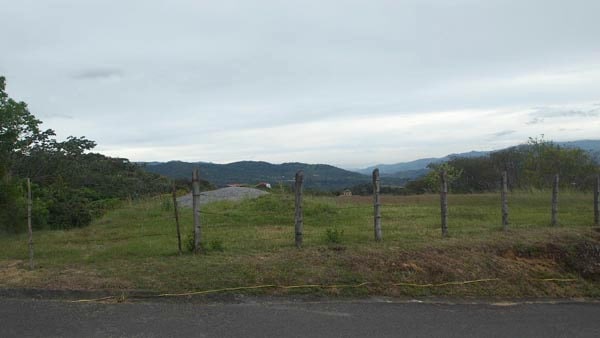
-
Squatters
The occupation of land by people who don’t belong there typically occurs when a property appears abandoned — nobody is staying there, there’s no fence and the grass hasn’t been cut in a year. Failure to pay property taxes can also be a green light to squatters who are alerted by sources within the municipality. Protect yourself against squatters by establishing a physical presence on your land, erecting fences, maintaining the property and paying your property taxes.
-
Will and power of attorney
Ask your attorney to write up a will and give your heirs the power of attorney to sell in case you pass away. A will from another country can be strangled in red tape in the Costa Rican courts.
-
Documents
Make copies of all the following documents and give them to your attorney and your heirs, on paper and in digital files:
• A copy of the deed
• A certified title search
• A copy of the survey map
• A copy of your will
• A copy of the powers of attorney
• A copy of the constitution of the corporation that owns your property
• A copy of the passport or residency papers that you used when you purchased the property
• A map showing how to find the property without having to use a surveyor.
-
Legal protection
Ask your real estate attorney about the possibility of putting a “cédula hipotecaria” on your property to protect you from others mortgaging your property or transferring the title without your knowledge.
Ivo Henfling founded the American-European Real Estate Group back in 1999, the first functioning MLS in Costa Rica with affiliate agents from coast to coast. You can read other articles like this on his blog. Contact Ivo at (506) 2289-5125 / 8834-4515

